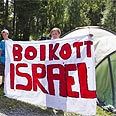
22 groups call for EU ban on Israeli settler products
Religious groups, charities urge European Union to boycott settlement goods saying ban would undercut settlers' economic reason for staying in 'occupied territories'
Twenty two religious groups and charities have called on the European Union to ban products made by Israeli settlers in the occupied territories, saying a boycott would undercut their economic reason for staying there.
The EU is Israel's biggest trading partner but imports 15 times more from West Bank-based Israeli settlers than from Palestinians, a group of 22 non-governmental organizations (NGOs) said on Tuesday.
Related stories:
- UN expert: Boycott companies in Israel settlements
- Norway's VITA halts sales of Ahava products
- Palestinians protest against settlement goods
"European consumers are unwittingly supporting the settlements and the attendant violations of human rights," the groups said in a report that called for a ban or, at the very least, strict labeling rules.
The Palestinians want to establish a state in the West Bank, Gaza and East Jerusalem and say settlements deny them a joined-up viable territory. About 311,000 Israeli settlers and 2.5 million Palestinians live in the West Bank.
The EU says settlements Israel has built on land it captured in the 1967 Middle East war are illegal under international law.
But the NGOs say EU consumption of Israeli cosmetics, dates, herbs and other products made in settler areas undermines the integrity of the EU position.
The 22 NGOs included Christian Aid, Ireland's Trocaire, the Methodist Church in Britain, the Church of Sweden, France's Terre Solidaire and Germany's medico international.
Other religious NGOs in Finland, Norway, the Netherlands, Denmark, Belgium and Switzerland also took part.
Groups urging stricter labeling rules
The report urged clearer labeling rules to help consumers identify the origin of produce. Such rules already exist in Denmark and Britain.
But the NGOs said a more effective solution would be to impose a ban on all settler products, a move that only one EU member state, Ireland, has so far asked for.
An official from Israel's Foreign Ministry said the report's figures were "cherry picked" to serve a political agenda.
"There are no official statistics on exports from the settlements," said Yigal Palmor, a Foreign Ministry spokesman. "They are only approximations."
The Israeli trade ministry said West Bank-produced exports accounted for only 1% of total EU-bound exports, which are around $70 million per year.
Israeli settler produce has already divided the United States and the United Nations.
On Oct. 25, the UN's special rapporteur Richard Falk called for a boycott of companies linked to Israeli settlements, but a US representative at the United Nations called the statement "irresponsible".
Critics say labeling and a boycott would not help Palestinians overcome the significant barriers they face when trying to export their own products.
Palestinian produce from the West Bank destined for Israel or for export must pass through Israeli checkpoints and is subject to lengthy checks and procedures.
Israel says such checks are necessary for security reasons, but the NGOs say they increase costs and decrease profitability.
The NGOs also criticized an Israeli ban on fertilizer use – ostensibly because it can be used in explosives – and said the Palestinians had inadequate access to water.
The value of Palestinian exports generated half the territories' gross domestic product in the 1980s but accounted for less than 15% in 2010, figures from the International Monetary Fund show.
However, the Manufacturers Association of Israel says that EU trade with their companies in the settlements is higher than that of their Palestinian counterparts because the Israeli businesses are more active.
Palmor, the foreign ministry spokesman, said Israel had offered the Palestinians access to water networks but said many had refused because they wanted to be self-sufficient.
"In a modern economy you can't have every village drilling for themselves," he said.
The EU has accused Israel of deliberately curbing economic development in the occupied West Bank. In May, EU foreign ministers said such a policy made it impossible to create a Palestinian state alongside Israel.
"Israeli restrictions remain a major impediment to sustainable economic growth," a spokesman for EU foreign affairs Chief Catherine Ashton said on Monday by email.
Settlements built on territory Israel captured in the 1967 war are a major obstacle to the resumption of Palestinian-Israeli peace talks.
The talks have been stalled since late 2010 over the issue of settlement construction in the West Bank and East Jerusalem.
Visiting Israel last week, Ashton said settlements "threaten to make a two-state solution impossible".
Israel cites historical and Biblical links to the West Bank and Jerusalem, saying the future of settlements should be decided in peace negotiations.
But Palestinian President Mahmoud Abbas is seeking full statehood recognition at the United Nations, claiming the land that Israel seized in the 1967 war is Palestinian territory. He wants East Jerusalem to be the capital of a new state.
- Receive Ynetnews updates directly to your desktop










